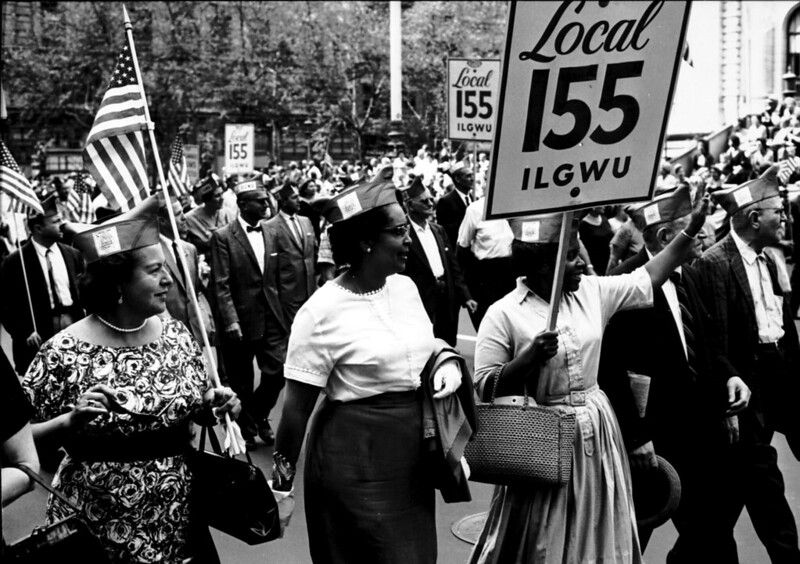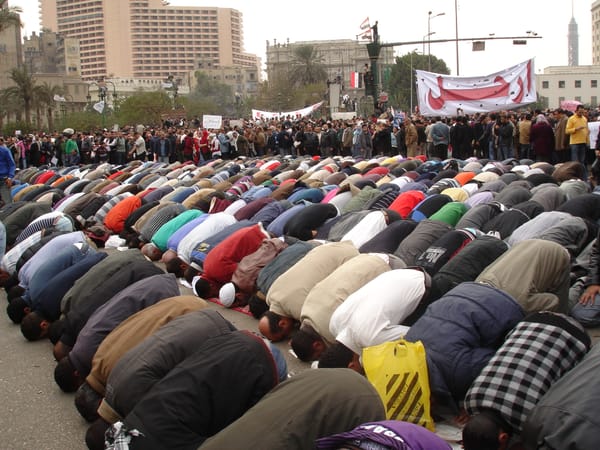Liberalism and Class

In the liberal ideal individuals pursue their own interests while participating equally in communal decisions, and have a say in the structures that directly and indirectly affect them—whether private arrangements or public/political ones. At the infancy of modern capitalism, one of the biggest hurdles to realizing this ideal was material well-being. It’s hard to say your life is a self-directed pursuit of your own ends, or that you have real opportunities to realize your full potential, when the great majority of your time and effort is spent on bare subsistence.
In this sense, life is not as bad as that for most in the West anymore, and continues to improve. However, while it’s great that in 100 years there may no longer be a need for the kind of labor-intensive jobs we know today, and you won’t find many experiencing a level of material deprivation akin to those of the past, a future of widespread material well-being with economic and political power concentrated in the hands of a few “masters of mankind” is still an illiberal future—and it’s one that appears to be our current trajectory, as corporate and political power and influence increases.
If wealth is simply part of the price of admission to power and influence, then the latter is worth talking about separately. To understand the dynamics of power and their danger to liberal values, the liberal must move beyond an analysis that starts and finishes with one individual interacting with another or with the state. Liberals are right to extol improving levels of material well-being in capitalist societies, but they must also appreciate the realities of classes—those that have influence and those that don’t. In doing so, the liberal will condemn many aspects of modern state capitalism.
Even when material deprivation was a greater threat to human well-being, liberal observers of the 18th and 19th century were concerned with more than that. Adam Smith, for example, undoubtedly understood that those granted special status, protection, permission, or authority by the state would enjoy material gain, but also pointed out the injustice of a person brokering themselves, or being put into a position of power to the detriment of others. Wealth can, and should, be discussed separately from unjust influence. You can be a “have” and “have-not” in either category.
Navigating the “have” and “have-not” paradigm was simpler when power was more clearly tied to, and represented by, absolute material well-being. Caricatures of wealth discrepancies from the 18th, through early 20th centuries are useful beyond that single dimension. Consider the 19th century contrast of a suit and top hat-wearing gentleman in front of his nice, big house hobnobbing with a local politician in 1850 on the one hand, and a working-class family with four dirt-stained kids cramped in a small London apartment on the other. These images should not only stimulate thoughts for a discussion on income differences, but also thoughts of power, influence, and social privilege. When we contrast the two groups sketched above, is there any question which of the two men—to borrow a phrase from Adam Smith—is a “master of mankind”? And, do we base that merely on the rich man’s house, or also that he has the politician’s ear?
This issue may be a little more subtle than it once was. As many lives improve worldwide in the material sense, sorting people into “haves” and “have-nots” in a way that meaningfully demonstrates the way power works proves more difficult. Let’s now picture two people with the exact same income and wealth in our times, but one is a successful business owner who largely keeps to themselves. The other is the heir to a legacy family fortune, and the president of an anti-immigrant, pro-tariff, business lobby group with 1000 member companies—they also happen to have a face-to-face meeting with the state senator in the calendar next week. Out of the two, we can probably say whose voice would be more influential in the political sphere.
Where many of today’s liberals succeed and fail
Let’s continue with the example above and say the second person and their business lobby group backs a tax code change, or anti-immigrant legislation. This is where many of today’s liberals both succeed and fail. Many liberals would (rightfully) denounce these propositions on grounds of morality and justice. But they will ignore the problem of the group’s position of influence, or their ability to advance their narrow interests by working with those who have power. Many liberals will critique specific policy proposals without questioning who shapes policies in the background and why they have privileged access to legislators.
Put another way, liberals rightly discuss the finer points of economic or social policies, but sometimes blow right past broader concerns for structural power, and the state-capitalist arrangements that sustain them. They may be concerned with a policy being pushed by a particular interest, but not as concerned with the bigger discussion on how power brokers, the influential, and “the wealthy hold and use state power for their own benefit.”1 This is not a sporadic bug in the system, but a continual feature of it.
Some may object to this characterization of a blind spot in the modern liberal’s point of view. Many liberals use public choice theory or the tools of political science to understand political incentives. Others object when politicians enable, and sometimes even collaborate with business on, rent-seeking. The dangers of political corruption and state action are commonly discussed by liberals as hindrances to liberty and good lawmaking.
However, the frameworks noted above need to be paired with the robust class analysis necessary for the liberal to truly see the distribution of power keeping the state-capitalist dynamic humming along. It is often not the output of spontaneous interaction on a relatively level playing field (e.g., the market) save for some fudging and undue influence. Rather, a lot of what’s on the capitalist scoreboard today is a demonstration of the results of social and economic policies consciously pursued by those in positions of power.
Simplistic views of power and influence
A view too simplistic on the problem of power, and one that even takes for granted that incidents of corruption are to be expected in an otherwise magnificent system, “yields the temptation to think that we are faced only with the problems of general public power, plus some relatively minor problems of particular public power.” 2[Italics mine] The liberal must recognize that a continual feature of a system where a liberal democratic order meets capitalism will see a constant push and pull between concentrations of power and the groups that hold them. Failing to recognize classes of “haves” and “have nots” of power and influence, means liberals won’t be able to see some of the most common pushing and pulling. The view that we have an otherwise just, functioning democratic and economic system susceptible to some clear-cut cases of corruption that we must pay attention to every now and then inspires a convenient apathy. 3
Indeed, the more serious senses in which the game is rigged and the arrangements benefit those with power in the long-run require thinking and attention that goes beyond the scandal of the day. The “haves” have power and influence in a more serious way, and the “have-nots” are in many senses just along for the ride. Political theorist Jacob T. Levy emphasizes this in an essay, Political Libertarianism, on the tricky business of constitutionalism. In one section he discusses constitutionalism and the balancing act between the problems of private power, general public power, and particular public power. The problem of private power is preventing “private persons from aggression against others”; the problem of general public power is preventing government “[tyranny] over private persons”; the problem of particular public power is ensuring “a government that cannot be used as an instrument by some private parties to aggress against or dominate others.” When discussing the problem of “particular public power,” Levy advises us:
it becomes especially important not to think first about the cases most easily called to mind by “rent-seeking”: a subsidy for football stadium owners here, a mercantilist tariff against imports there, some eminent domain to take land and give it away to a private developer, occupational licensing or excessively strong intellectual property, all publicly approved through regular due process in a system more or less governed by the rule of law. The normal sense in which the wealthy hold and use governing power is much more pervasive. It includes, for example, the direct enrichment of office-holders via what we would now identify as corruption, self-dealing, and conflicts of interest…
…we ignore the genuinely deep problems of particular public power, because we treat the impartiality and stability of the state as reasonably fixed background conditions.
Levy further counsels us not to think of problems like this simply as ones of reducing the state and its power, or ones that can be addressed by the dream of “solving politics once and for all.” That would be a “fantasy” where we rid ourselves of these issues by getting a constitution, set of rules, or societal framework just right, and avoid the constant discussion, awareness, and balancing act required to recognize what interest groups and centers of power are up to and keep them in check.
To improve thinking in this area is a twofold challenge. The liberal first must push themselves to expand their frameworks of analysis by broadening their concept of power, influence, how it concentrates, and how it operates, and in doing so realize the problem they more clearly recognize is not one so easily solved. In fact, the push and pull won’t ever be solved because it is not a problem that can be solved, but is a constant struggle. The work of maintaining a truly liberal framework for all to enjoy is never completed.
Forests of state-capitalism, trees of wealth
Again, it’s understandable that critiquing injustices brought about by concentrated power becomes a little tougher with the backdrop of great amounts of national wealth and increasing material well-being. Perhaps increasing general wealth has not only made it more difficult to spot these inequalities, but also softened our desire to correct them as seriously as before.
When people are relatively comfortable with their lives, they seem more willing to settle with the idea that corporate or government corruption, power, and influence are annoying, peripheral facts of life rather than a continuing dynamic that can (or should) be dismantled.
This is partially rational, especially if the ways life is influenced by these dynamics is hidden from plain view, leaving you to go about their day-to-day life unbothered by the reality. Why worry about amendments to the criminal code of your country being pushed for by a corporation, or the fact that an executive from an arms manufacturer staffs a senior government position that influences the direction of armed conflicts, if that has nothing to do with your daily drive to purchase a nonfat mocha? If this is true to some degree for those with a modest level of material comfort, it must be even more true as you climb up the ladder of wealth and choose to increasingly retreat into, and preoccupy yourself with, your private affairs.
Referencing mocha routines may seem flippant, but it’s meant as a serious point. It is harder to convince people that the same economic and political arrangements they and many others benefit from every day may be, in some unseen ways, mildly to grotesquely unjust. Even if some pay lip service to their hatred for corporate corruption of state power, at some level they must also wonder what cost fixing these structural problems would come with, if those costs would detract from some of the benefits they privately enjoy, and if the problem is really as bad as some describe.
That material and physical well-being may comfort our concerns with the uneven distribution of influence (and the injustices that stem from it) is certainly not a novel idea. Nor is the assertion that this comfort might really be a form of short-sighted complacency by those privileged enough to be complacent.
Bakunin notes that eliminating the disparity of power between classes will require a massive disruption of the frameworks and arrangements that maintain the material wealth and lifestyles of many. He goes on to remind the most downtrodden and underprivileged in his home-country of Russia that dreams of even the most sympathetic people from the more well-off classes committing themselves to rectifying social injustices and disturbing existing arrangements will most likely go unrealized. Even if the propertied and well-off of his day sympathized with the most deprived getting a raw deal from unbalanced structures of power that the aristocrats and royals enjoyed, he posited there was very little chance many would ever go so far as to seriously consider a rectification of these injustices if it involved the destruction of their lifestyles, status, or wealth. To him, truly fixing these imbalances would be “incompatible with the bourgeois consciousness, with bourgeois civilization, for the latter is built entirely on the fanatical worship of property. A burgher or [bourgeoise] would sooner give up his life, liberty, and honour than renounce his property.”4
The point is both logical and timeless outside late 19th century Russian anarchist propaganda. Those with even a modestly comfortable level of material wealth be more cautious about social and political changes—even if they recognize injustices that come with the concentrated power and influence that others have.
What’s next?
Thanks to modern state-capitalist arrangements and the growing wealth of nations, the idea that the rich get richer and the poor get poorer is not strictly true in the absolute sense. However, what does seem to be true is the powerful get more powerful as they fortify their economic and political privilege, and adjust with the times—in ways that include, and go beyond, a law here, and a couple of special arrangements or subsidies there. Over time, those outside structures of power will get pushed more to the outside, and their ability to exert influence on the power structures and arrangements steering the course of the economy and political sphere lessens. We may all be having fun with the amenities provided by this carnival cruise, but most of us have nothing to do with where it’s heading. And, it cannot be overstated that this isn’t a stagnant set of affairs—there is no end to the problem of power and influence. The simple fact is, the less those with it are made to consider and listen to you, the less they will as time goes on.
Liberals should celebrate economic growth and the increases in global wealth that come when markets and free association flourish, but we must not forget to critique the larger systematic defects and injustices as much as the small-time ones. Taking liberal ideals and principles seriously means material benefits can never make up for these kinds of injustices. Furthermore, it means ensuring our lens of analysis is sufficiently wide to allow for serious conversations about power, influence, class, and class interest, without dismissing these ideas as discredited relics of Marxist thought.
It is possible to praise the wonders of markets; support frameworks that enable individuals to pursue their own interests and improve their lot in life; advance freedom of association and defend freedom from overbearing social authority; all while employing broader class analysis and sharp critiques of power and influence in our discussions about the political and social order.
1From the essay “Political Libertarianism” by Jacob T. Levy
2 See note 1
3It is interesting to note that when the establishment media (specifically in the United States) reports on a story of corruption (e.g,. mishandling of funds, nepotistic appointments to positions of authority, backroom discussions that clearly demonstrate ongoing collusion between corporations and a certain Senator, etc.), it is framed in such a way that makes the reader feel as though they should be outraged at an instance of cancer or infection in a system that based on principles and a desire to do right, rather than any idea that this quite literally is business as usual. People that want to take a close look at ongoing systems of power and influence in Western societies (and speak to others about it) should recognize how the vast majority of people are made to internalize ideals and assumptions about private and political structures that don’t hold up to more serious thought.
4 From Page 28 of Statism and Anarchy (2005 printed edition of the Cambridge Texts in the History of Political Thought).
Featured Image is International Ladies Garment Workers Union Local 155 members march in a parade




